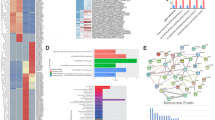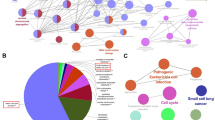Abstract
Methyl-CpG-binding protein 2 (MeCP2) is essential in human brain development and has been linked to several cancer types and neuro-developmental disorders. This study aims to screen the MeCP2 related differentially expressed genes and discover the therapeutic targets for osteosarcoma. CCK8 assay was used to detect the proliferation and SaOS2 and U2OS cells. Apoptosis of cells was detected by flow cytometry analysis that monitored Annexin V-APC/7-DD binding and 7-ADD uptake simultaneously. Denaturing formaldehyde agarose gel electrophoresis was employed to examine the quality of total RNA 18S and 28S units. Gene chip technique was utilized to discover the differentially expressed genes correlated with MeCP2 gene. Differential gene screening criteria were used to screen the changed genes. The gene up-regulation or down-regulation more than 1.5 times was regarded as significant differential expression genes. The CCK8 results indicated that the cell proliferation of MeCP2 silencing cells (LV-MeCP2-RNAi) was significantly decreased compared to non-silenced cells (LV-MeCP2-RNAi-CN) (P < 0.05). MeCP2 silencing could also induce significant apoptosis compared to non-silenced cells (P < 0.05); 107 expression changed genes were screened from a total of 49,395 transcripts. Among the total 107 transcripts, 34 transcripts were up-regulated and 73 transcripts were down-regulated. There were five significant differentially expressed genes, including IGFBP4, HOXC8, LMO4, MDK, and CTGF, which correlated with the MeCP2 gene. The methylation frequency of CpG in IGFBP4 gene could achieve 55 %. In conclusion, the differentially expressed IGFBP4, HOXC8, LMO4, MDK, and CTGF genes may be involved in MeCP2 gene-mediated proliferation and apoptosis in osteosarcoma cells.





Similar content being viewed by others
References
Miao JL, Wu S, Peng Z, Tania M, Zhang C. MicroRNAs in osteosarcoma: diagnostic and therapeutic aspects. Tumor Biol. 2013;34(4):2093–8.
Stiller CA. International patterns of cancer incidence in adolescents. Cancer Treat Rev. 2007;33(7):631–45.
Futamura N, Nishida Y, Urakawa H, Kozawa E, Ikuta K, Hamada S, et al. EMMPRIN co-expressed with matrix metalloproteinases predicts poor prognosis in patients with osteosarcoma. Tumor Biol. 2014;35(6):5159–65.
Ando K, Heymann MF, Stresing V, Mori K, Redini F, Heymann D. Current therapeutic strategies and novel approaches in osteosarcoma. Cancer (Basel). 2013;5(2):591–616.
Jones PA. DNA methylation and cancer. Oncogene. 2002;21(35):5358–60.
Siedlecki P, Zielenkiewicz P. Mammalian DNA methyltransferases. Acta Biochim Pol. 2006;53(2):245–56.
Silva TD, Vidigal VM, Felipe AV, de Lima JM, Neto RA, Saad SS, et al. DNA methylation as an epigenetic biomarker in colorectal cancer. Oncol Lett. 2013;6(6):1687–92.
Lyko F, Brown R. DNA methyltransferase inhibitors and the development of epigenetic cancer therapies. J Natl Cancer Inst. 2005;97(20):1498–506.
Yaqinuddin A, Abbas F, Nagvi SZ, Bashir MU, Qazi R, Qureshi SA. Silencing of MBD1 and MeCP2 in prostate-cancer-derived PC3 cells produces differential gene expression profiles and cellular phenotype. Biosci Rep. 2008;28(6):319–26.
Yi JM, Dhir M, Guzzetta AA, Lacobuzio-Donahue CA, Heo K, Yang KM, et al. DNA methylation biomarker candidates for early detection of colon cancer. Tumor Biol. 2012;33(2):363–72.
Keller S, Angrisano T, Florio E, Pero R, Decaussin-Petrucci M, Troncone G, et al. DNA methylation state of the galectin-3 gene represents a potential new marker of thyroid malignancy. Oncol Lett. 2013;6(1):86–90.
Muotri AR, Marchetto MC, Coufal NG, Oefner R, Yeo G, Nakashima K. L1 retrotransposition in neurons is modulated by MeCP2. Nature. 2010;468(7322):443–6.
Schena M, Shalon D, Davis RW. Quantitative monitoring of gene expression patterns with a complementary DNA microarray. Science. 1995;270(5235):467–70.
Zhang Y, Zhang L, Zhang G, Li S, Duan J, Cheng J, et al. Osteosarcoma metastasis: prospective role of ezrin. Tumor Biol. 2014;35(6):5055–9.
Chen TW, Li HP, Lee C, Gan RC, Huang PJ, Wu TH, et al. ChIP seek, a web-based analysis tool for ChIP data. BMC Genomics. 2014;15(1):539.
Xu K, Liu XN, Zhang HB, An N, Wang Y, Zhang ZC, et al. Replication-defective HSV-1 effectively targets trigeminal ganglion and inhibits viral pathopoiesis by mediating interferon gamma expression in SH-SY5Y cells. J Mol Neurosci. 2014;53(1):78–86.
Reynolds A, Leake D, Boese Q, Scaringe S, Marshall WS, Khvorova A. Rational siRNA design for RNA interference. Nat Biotechnol. 2004;22(3):326–30.
Squillaro T, Alessio N, Cipollaro M, Renieri A, Giordano A, Galderisi U. Partial silencing of methyl cytosine protein binding 2 (MECP2) in mesenchymal stem cells induces senescence with an increase in damaged DNA. FASEB J. 2010;24(5):1593–603.
Mirza S, Sharma G, Parshad R, Gupta SD, Pandya P, Ralhan R. Expression of DNA methyltransferases in breast cancer patients and to analyze the effect of natural compounds on DNA methyltransferases and associated proteins. J Breast Cancer. 2013;16(1):23–31.
Do SI, Ko E, Kang SY, Lee JE, Nam SJ, Cho EY, et al. Aberrant DNA methylation of integrin alpha-4 inhuman breast cancer. Tumor Biol. 2014;35(7):7079–84.
Grigoras D, Pirtea L, Ceausu RA. Endothelial progenitor cells contribute to the development of ovarian carcinoma tumor blood vessels. Oncol Lett. 2014;7(5):1511–4.
Zhao LY, Zhang J, Guo B, Yang J, Han J, Zhao XG, et al. MeCP2 promotes cell proliferation by activating ERK1/2 and inhibiting p38 activity in human hepatocellular carcinoma HEPG2 cells. Cell Mol Biol Suppl. 2013;59:OL1876–81.
Bernard D, Gil J, Dumont P, Rizzo S, Monte D, Quatannens B, et al. The methyl-CpG-binding protein MeCP2 is required for prostate cancer cell growth. Oncogene. 2006;25(9):1358–66.
Jones JI, Clemmons DR. Insulin-like growth factors and their binding proteins: biological actions. Endocr Rev. 1995;16(1):3–34.
Lewinski A, Marcinkowska M, Brzezianska E, Jeziorowska A, Wloch J, Brzezinski J. Expression of insulin-like growth factor I gene and of genes for IGF-binding proteins 1, 2, 3, 4 (IGFBP-1-IGFBP-4) in non-neoplastic human thyroid cells and in certain human thyroid cancers. Effect of exogenous IGF-I on this expression. Endocr Res. 2004;30(1):47–59.
Ryan AJ, Napoletano S, Fitzpatrick PA, Currid CA, O’Sullivan NC, Harmey JH. Expression of a protease-resistant insulin-like growth factor-binding protein-4 inhibits tumor growth in a murine model of breast cancer. Br J Cancer. 2009;101(2):278–86.
Alami Y, Castronovo V, Belotti D, Flagiello D, Clausse N. HOXC5 and HOXC8 expression are selectively turned on in human cervical cancer cells compared to normal keratinocytes. Biochem Biophys Res Commun. 1999;257(3):738–45.
Waltregny D, Alami Y, Clausse N, de Leval J, Castronovo V. Overexpression of the homeobox gene HOXC8 in human prostate cancer correlations with loss of tumor differentiation. Prostate. 2002;50(3):162–9.
Li Y, Chao F, Huang B, Liu D, Kim J, Huang S. HOXC8 promotes breast tumorigenesis by transcriptionally facilitating cadherin-11 expression. Oncotarget. 2014;5(9):2596–607.
Yu J, Ohuchida K, Nakata K, Mizumoto K, Cui L, Fujita H, et al. LIM only 4 is overexpressed in late stage pancreas cancer. Mol Cancer. 2008;7(1):93.
Mousses S, Bubendorf L, Wagner U, Hostetter G, Kononen J, Comelison R, et al. Clinical validation of candidate genes associated with prostate cancer progression in the CWR22 model system using tissue microarrays. Cancer Res. 2002;62(5):1256–60.
Cui L, Xie R, Dang S, Zhang Q, Mao S, Chen J, et al. NOV promoted the growth and migration of pancreatic cancer cells. Tumor Biol. 2014;35(4):3195–201.
Tomizawa M, Yu L, Wada A, Tamaoki T, Kadomatsu. A promoter region of the midkine gene that is frequently expressed in human hepatocellular carcinoma can activate a suicide gene as effectively as the alpha-fetoprotein promoter. Br J Cancer. 2003;89(6):1086–90.
Erguven M, Bilir A, Yazihan N, Korkmaz S, Aktas E, Ovalioglu C, et al. Imatinib mesylate decreases the cytotoxic effect of roscovitine on human glioblastoma cells in vitro and the role of midkine. Oncol Lett. 2012;3(1):200–8.
Hao H, Maeda Y, Fukazawa T, Yamatsuji T, Takaoka M, Bao XH, et al. Inhibition of the growth factor MDK/midkine by a novel molecule compound to treat non-small cell lung cancer. PLoS One. 2013;8(8):e71093.
Zhou ZQ, Zao WH, Xie JJ, Lin J, Shen ZY, Zhang QY, et al. Expression and prognostic significance of THBS1, cyr61 and CTGF in esophageal squamous cell carcinoma. BMC Cancer. 2009;9(1):291.
Bennewith KL, Huang X, Ham CM, Graves EE, Erler JT. The role of tumor cell-derived connective tissue growth factor (CTGF/CCN2) in pancreatic tumor growth. Cancer Res. 2009;69(3):775–84.
Jia XQ, Cheng HQ, Li H, Zhu Y, Li YH, Feng ZQ, et al. Inhibition of connective tissue growth factor overexpression decreases growth of hepatocellular carcinoma cells in vitro and in vivo. Chin Med J (Engl). 2011;124(22):3794–9.
Wang L, Chen Z, Wang Y, Chang D, Su L, Guo Y, et al. WWTR1 promotes cell proliferation and inhibits apoptosis through cyclin A and CTGF regulation in non-small cell lung cancer. Tumor Biol. 2014;35(1):463–8.
Acknowledgments
This work was supported by a grant from the National Natural Science Foundation of China (81001198 and 81372864).
Conflicts of interest
None
Author information
Authors and Affiliations
Corresponding author
Rights and permissions
About this article
Cite this article
Meng, G., Li, Y., lv, Y. et al. Preliminary screening of differentially expressed genes involved in methyl-CpG-binding protein 2 gene-mediated proliferation in human osteosarcoma cells. Tumor Biol. 36, 3009–3015 (2015). https://doi.org/10.1007/s13277-014-2935-4
Received:
Accepted:
Published:
Issue Date:
DOI: https://doi.org/10.1007/s13277-014-2935-4




